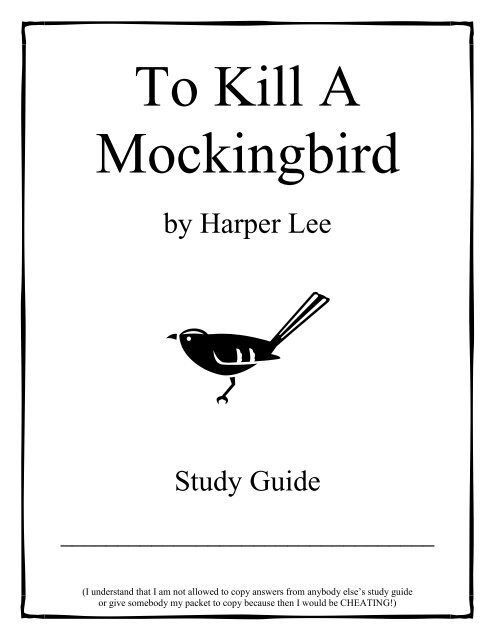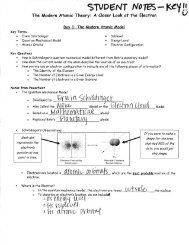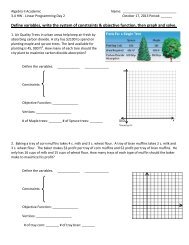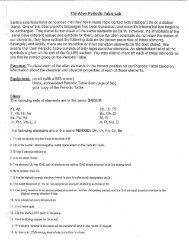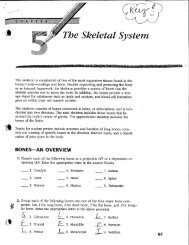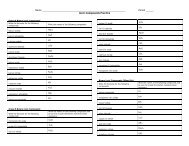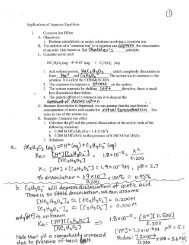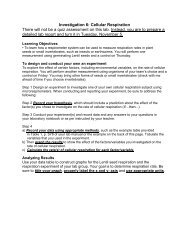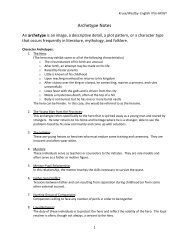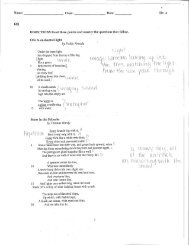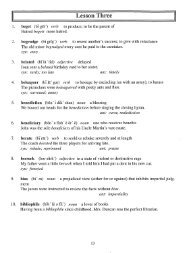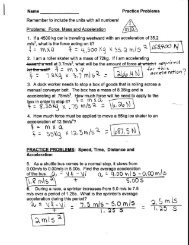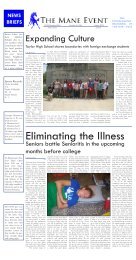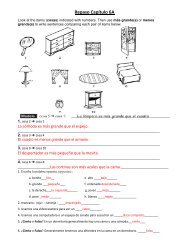TKAM Study Guide
TKAM Study Guide
TKAM Study Guide
You also want an ePaper? Increase the reach of your titles
YUMPU automatically turns print PDFs into web optimized ePapers that Google loves.
To Kill A<br />
Mockingbird<br />
by Harper Lee<br />
<strong>Study</strong> <strong>Guide</strong><br />
_________________________________<br />
(I understand that I am not allowed to copy answers from anybody else’s study guide<br />
or give somebody my packet to copy because then I would be CHEATING!)
Life & Writings of Harper Lee<br />
Background Notes<br />
______________________________________________________________________<br />
________________________________________________________________________<br />
________________________________________________________________________<br />
________________________________________________________________________<br />
African-Americans in the 30’s (equality issues)<br />
________________________________________________________________________<br />
________________________________________________________________________<br />
________________________________________________________________________<br />
________________________________________________________________________<br />
American Civil Rights Era during which Lee wrote & published the novel<br />
________________________________________________________________________<br />
________________________________________________________________________<br />
________________________________________________________________________<br />
________________________________________________________________________<br />
Voting Rights of African Americans in the 1930’s<br />
________________________________________________________________________<br />
________________________________________________________________________<br />
________________________________________________________________________<br />
________________________________________________________________________<br />
Birmingham<br />
________________________________________________________________________<br />
________________________________________________________________________<br />
________________________________________________________________________<br />
________________________________________________________________________<br />
1
The Great Depression<br />
Background Notes<br />
________________________________________________________________________<br />
________________________________________________________________________<br />
________________________________________________________________________<br />
________________________________________________________________________<br />
The Scottsboro Trials<br />
________________________________________________________________________<br />
________________________________________________________________________<br />
________________________________________________________________________<br />
________________________________________________________________________<br />
Segregation<br />
________________________________________________________________________<br />
________________________________________________________________________<br />
________________________________________________________________________<br />
________________________________________________________________________<br />
South during the 1930’s<br />
________________________________________________________________________<br />
________________________________________________________________________<br />
________________________________________________________________________<br />
________________________________________________________________________<br />
Emmett Till<br />
________________________________________________________________________<br />
________________________________________________________________________<br />
________________________________________________________________________<br />
________________________________________________________________________<br />
2
THEME<br />
Theme is the central, underlying, and controlling idea of a literary work. It is an abstract<br />
concept that may be represented by a character, actions, or images in the literary work. It is a<br />
generalization about human conduct. Unlike the moral of a fable, the theme of a story is<br />
seldom, if ever, stated explicitly. Theme is almost always implicit.<br />
Consider this…a theme is a meaning of a work. (Yes, there can be more than one<br />
“meaning.”) Can the meaning of a work be love? hate? greed? No, that makes no sense!<br />
Those are just topics, not themes. The theme is the statement an author is making about a<br />
topic.<br />
For example, if love is a topic/subject of two novels, a major theme in one of the novels<br />
could be “Love, if taken to extremes, can be negative rather than positive,” while in the<br />
other novel, the theme might be “Love can conquer even the greatest evil.” Notice that<br />
the topic/subject is the same, but the messages about that topic/subject are different in<br />
different works.<br />
In order to identify theme, ask the following questions:<br />
How has the main character changed?<br />
What lessons has he/she learned?<br />
What is the central conflict in the story?<br />
Themes of To Kill a Mockingbird might include the following subjects:<br />
o Human Compassion<br />
o Individual Conscience and Personal Integrity<br />
o Maturation<br />
o Prejudice<br />
o Discrimination<br />
o Tolerance<br />
o Loneliness<br />
o Education<br />
o Equality<br />
o Crime and Punishment<br />
o The Law<br />
o Courage/Bravery<br />
3
<strong>TKAM</strong> Connections<br />
Give your opinions or reactions to the following 12 statements by writing the numbers 1, 2,<br />
3, or 4 in the blank preceding the statement. Use the following scale:<br />
_____ 1. All men are created equal.<br />
_____ 2. Girls should act like girls.<br />
_____ 3. It’s okay to be different.<br />
_____ 4. Nobody is all bad or all good.<br />
1 = I strongly agree<br />
2= I agree somewhat<br />
3= I disagree somewhat<br />
4= I strongly disagree<br />
_____ 5. Some words are so offensive that they should never be stated or written.<br />
_____ 6. Under our justice system, all citizens are treated fairly.<br />
_____ 7. The old adage, “Sticks and stones may break your bones, but words will never hurt<br />
you,” is true.<br />
_____ 8. Speaking standard grammar proves that a person is smart.<br />
_____ 9. A hero is born, not made.<br />
_____ 10. No one is above the law.<br />
_____ 11. Education is the great equalizer.<br />
_____ 12. When the law does not succeed in punishing criminals, citizens should do so.<br />
4
<strong>Study</strong> <strong>Guide</strong><br />
Chapter 1<br />
1. Which characters do we meet in this first chapter?<br />
2. What is the setting of the novel? Why is it so important?<br />
3. In what year is the story taking place?<br />
4. From what point of view is the story being told?<br />
5. What does Atticus Finch do for a living?<br />
6. Do Scout and Jeremy have a mother? Why or why not?<br />
7. Who lives next door to the Finch’s? Who stays with her in the summer?<br />
8. Why do the children like to play with Dill?<br />
9. What is unusual about the Radley house? Why is it unusual?<br />
10. What are some of the children’s superstitions concerning Boo?<br />
11. Name an allusion found in chapter one. (include citation)<br />
12. Name a metaphor found in chapter one. (include citation)<br />
Chapter 2<br />
1. Why had Dill been staying in Maycomb?<br />
2. What great thing happens to Scout in this chapter?<br />
3. What historical allusion is found in chapter two?<br />
5
4. Why does the teacher, Miss Caroline Fisher, become annoyed with Scout?<br />
5. How had Scout learned to read and write?<br />
6. How else does Scout get in trouble with the teacher?<br />
7. What is Scout’s full name?<br />
Chapter 3<br />
1. Why does Scout beat up Walter Cunningham in the schoolyard?<br />
2. What does Jem do about the situation?<br />
3. Why does it take Walter so long to make up his mind?<br />
4. What happens that afternoon in school that alarms the teacher?<br />
5. What prompts Scout to decide to quit school and run away?<br />
6. Atticus said that “you never really understand a person until you consider things from his<br />
point of view – until you climb into his skin and walk around in it.” What does this quote<br />
mean?<br />
7. Name a simile found in chapter three. (include citation)<br />
Chapter 4<br />
1. How does Scout continue to view her school life?<br />
2. What does Scout find in the tree in Radley’s front yard?<br />
3. What do she and Jem find a couple days later?<br />
6
4. What are several of the summertime games that Dill, Jem, and Scout play?<br />
5. What happens to Scout when she rolls in the tire?<br />
6. Scout seems fairly certain that Boo Radley is alive. Why?<br />
7. Name a simile found in chapter four. (include citation)<br />
Chapter 5 Summary<br />
Disturbed by the game and Jem and Dill’s growingly exclusive friendship, Scout seeks<br />
the company of Miss Maudie Atkinson, a neighbor who is open-minded and friendly to Scout.<br />
Miss Maudie loves flowers and is sympathetic concerning the Radleys.<br />
But against Scout’s better judgment, she sometimes becomes embroiled in the boys’<br />
schemes. Their plan to send a note to Boo through a window by means of a fishing pole fails<br />
when Atticus catches them. Atticus scolds them and says, “stop tormenting that man…what Mr.<br />
Radley did was his own business” (65).<br />
Chapter 6<br />
1. What is the children’s plan for Dill’s last night in Maycomb?<br />
2. How do they keep a squeaky gate from making noise?<br />
3. How does Jem lose his pants?<br />
4. How does Dill explain the loss of the pants?<br />
5. Does Nathan Radley know who was in his backyard?<br />
6. What does Jem feel that he has to do?<br />
7. Why doesn’t Scout want Jem to go?<br />
8. Is Jem successful in retrieving his pants?<br />
7
Chapter 7<br />
1. What age are the children now?<br />
2. What remarkable thing does Jem tell Scout about that night he had to go back after his pants?<br />
3. What do they find in the knothole in the tree?<br />
4. What do the children plan to do about the things that they find in the knothole of the tree?<br />
5. Why does Jem cry when he sees the cemented-up knothole?<br />
6. Name a simile found in chapter seven. (include citation)<br />
Chapter 8 Summary<br />
A period of unusual cold strikes Maycomb. One day it even snows, bringing Jem and<br />
Scout the joy of a school holiday and snowman-building. Mr. Avery tells the children, “it’s bad<br />
children like you makes the seasons change” (87). There is a dark side to the cold snap,<br />
however. That night, Miss Maudie’s house catches on fire. Though much of her furniture is<br />
saved, the house is a total loss. For safety from the fire, the children stand outside away from the<br />
flames in front of the Radley house. Not until she gets home does Scout realize that Boo<br />
sneaked out and wrapped a blanket around her shoulders.<br />
Chapter 9<br />
1. Why does Scout get in a fight with Cecil Jacobs?<br />
2. What is Atticus about to do which places his honor in question?<br />
3. Why is Atticus defending the man?<br />
4. Does Atticus expect to win the case? Why or why not?<br />
5. How does this affect Scout?<br />
6. What do the Finches do at Christmas time?<br />
7. How do the children feel about their relatives?<br />
8
Chapter 10<br />
1. What doesn’t Scout like about Atticus?<br />
2. What does Atticus say about mockingbirds? What does this mean?<br />
3. What does Atticus do which makes him a hero in the sight of his children?<br />
Chapter 11 Summary<br />
Jem is upset that a neighbor, Mrs. Dubose who is ill and a difficult old woman, insults<br />
Atticus, so he knocks the tops off of all her camellia bushes. As punishment, Jem is forced to<br />
read to her for two hours every afternoon for one month. After she dies, Jem finds out along<br />
with Scout that Mrs. Dubose was very courageous in trying to kick her morphine addiction.<br />
1. What does Atticus tell Jem about Mrs. Dubose after her death?<br />
Chapter 12 – 14 Summaries<br />
Early in the summer Atticus leaves the children with Calpurnia for two weeks to attend<br />
an emergency meeting of the state legislature. Jem, who is twelve years old, and Scout, who is<br />
eight years old, accompany Calpurnia to her church in which they encounter prejudice for the<br />
first time. Lula stops them saying “you ain’t got no business bringin’ white chillum here – they<br />
got their own church, we got our’n” (158). Calpurnia seems to be living a double life because<br />
she doesn’t speak like the rest of the colored folks. In addition, there are no hymn books since<br />
most of the black congregation cannot read. Collection is taken for Helen Robinson, Tom<br />
Robinson’s wife. When they return home, they find Aunt Alexandra sitting on the front porch.<br />
Furthermore, Jem is acting self-absorbed, and Scout is disappointed that Dill is not coming for<br />
the summer.<br />
Aunt Alexandra has come to stay during the trial. She wants to be a feminine influence<br />
for Scout, but Scout suspects the real reason for her aunt’s visit is her wish to instill family pride<br />
in Jem and Scout. The children are dismayed to see Aunt Alexandra since she might change the<br />
relationship that they have with Atticus.<br />
Aunt Alexandra persists in her campaign to make Scout a lady. Horrified to learn that<br />
Scout and Jem have been to church with Calpurnia and that Scout wants to visit Calpurnia’s<br />
home, Aunt Alexandra asks Atticus to get rid of Calpurnia due to being a bad influence on the<br />
children. However, Atticus stands firm and supports keeping Calpurnia because she has been a<br />
loyal and indispensable member of the family.<br />
That night when Scout is climbing into bed, she steps on something in the dark. Fearing<br />
a snake, she gets Jem, who pokes under the bed with a broom. A filthy and hungry Dill emerges,<br />
explaining that he has run away from his mother and new stepfather because “they just weren’t<br />
interested in me” (190). After much pleading, Dill is allowed to remain in Maycomb for the<br />
summer.<br />
9
Chapter 15<br />
1. What does it mean in Maycomb when grown men stand outside in the front yard instead<br />
of coming into the house?<br />
2. Which side does Aunt Alexandria take concerning the trial?<br />
3. When Atticus sits in front of the jail, what is Atticus concerned about?<br />
4. Give two of Atticus’ sayings which Scout considers important.<br />
<br />
<br />
Chapter 16 Summary<br />
The next morning, Atticus tries to put the mob scene at the jail in perspective for Jem and<br />
Scout. He says that Mr. Cunningham was not acting as an individual the preceding night but was<br />
acting as part of a general mob. When the children appeared, Scout’s remarks made Walter<br />
Cunningham remember that he was human and forced him to stand in Atticus’ shoes. Before<br />
departing for the courthouse, Atticus warns Jem and Scout not to go downtown.<br />
With Dill for company, the children go outside and watch what seems like the entire<br />
county pass by. Jem provides a running commentary for Dill, describing everyone. Of particular<br />
interest is Dolphus Raymond, a white drunkard who lives with a black woman. In addition, the<br />
children encounter the Idlers at the Maycomb County courthouse. The Idlers Club is made up of<br />
old men who have spent their lives doing nothing and passed their twilight days doing the same<br />
under the live oaks on the square in front of the courthouse.<br />
After Atticus comes home for lunch and announces that the jury has been chosen, the<br />
children can stand the suspense no longer. In defiance of Atticus’ warning, they go to the<br />
courthouse. While waiting for the proceedings to resume, Scout hears that Atticus was appointed<br />
by the court to defend Tom and didn’t really have a choice in the matter. However, she also<br />
hears Atticus condemned for putting real effort into the assignment.<br />
Chapter 17<br />
1. What position does Heck Tate hold in Maycomb?<br />
2. In a few words, what is Heck Tate’s testimony?<br />
3. What kind of people are the Ewells?<br />
4. What is Mr. Ewell’s testimony?<br />
5. What was Atticus trying to show to the jury?<br />
10
Chapter 18<br />
1. Describe Mayella Ewell.<br />
2. Atticus cross-examines Mayella. What kind of life does she live?<br />
3. What is Mayella’s testimony?<br />
4. Why does Mayella accuse Atticus of “mockin” her?<br />
5. Tom Robinson did not beat and rape Mayella. How do we know?<br />
6. What points does Atticus try to establish through Mayella’s testimony or lack of it?<br />
Chapter 19<br />
1. How well does Tom Robinson know Mayella?<br />
2. Did she pay Tom?<br />
4. What is the true story of the “rape”?<br />
5. “As Tom Robinson gave his testimony, it came to me that Mayella Ewell must have been<br />
the loneliest person in the world…She was as sad, I thought, as what Jem called a mixed<br />
child: white people wouldn’t have anything to do with her because she lived among the pigs;<br />
Negroes wouldn’t have anything to do with her because she was white. Tom Robinson was<br />
probably the only person who was ever decent to her. But she said that he took advantage of<br />
her, and when she stood up she looked at him as if he were dirt beneath her feet” (256-257).<br />
What does this show about Maycomb society?<br />
Chapter 20<br />
1. Why does Mr. Raymond drink coke from a paper bag?<br />
2. Why does he want people to think that he’s drunk?<br />
3. Quote an appeal from Atticus’ closing arguments that you think was poignant.<br />
11
Chapter 21-24 Summaries<br />
Just before the jury is charged, Calpurnia appears in the courtroom to tell Atticus that Scout<br />
and Jem have been missing since afternoon. The children are summoned downstairs since they<br />
have been in the courtroom listening to the trial.<br />
Everyone is waiting for the verdict after Atticus previously said to the jury that “our courts<br />
are the great levelers, and in our courts all men are created equal” (274). Reverend Sykes tells<br />
Jem, “I ain’t ever seen any jury decide in favor of a colored man over a white man…” (279).<br />
Not until after eleven o’clock does the jury return its verdict: guilty. Scout already knew the<br />
verdict was guilty since the jurors did not look at Tom. As Atticus wearily walks down the<br />
center aisle, all the blacks stand in respect. Jem sobs in fury all the way home, but Atticus is too<br />
tired to comfort him.<br />
The next morning, Calpurnia shows Atticus a vast array of food left for the family by the<br />
black community. Others try to express their admiration for Atticus, too. Miss Maudie invites<br />
the children to her porch for cake, giving Jem a slice from the big cake to signify his adult status.<br />
She reminds them that their father is no ordinary person and that many in Maycomb support his<br />
efforts. But the glow of her words is soon dimmed by Miss Stephanie’s news. She reports that<br />
Bow Ewell spat in Atticus’ face and promised revenge.<br />
In the aftermath of the trial and Bob Ewell’s threat, Scout and Jem fear something will<br />
happen to Atticus. Atticus explains that Mr. Ewell just had to have the last word in order to save<br />
face. Atticus also reveals that one of Tom’s sympathizers on the jury was a Cunningham – a<br />
member of the Old Sarum gang that tried to lynch Tom.<br />
Scout and Jem still struggle to define background. Scout finally decides that there is only<br />
one kind of folks: folks. But Jem doubts that, pointing out that people don’t get along with each<br />
other.<br />
Aunt Alexandria’s missionary circle come to the house for tea, and Scout attends wearing<br />
a ladylike dress in order to learn to be a lady. The ladies listen to an appalling description of life<br />
among a tribe of Africans and then adjourn for refreshments. The conversation centers on the<br />
local black population and ranges from Tom Robinson’s wife in particular to sulky blacks in<br />
general. Scout decides she feels more at home in her father’s world.<br />
In the midst of the tea, Atticus arrives home with the news that Tom is dead. Tom lost<br />
hope. During an exercise period at the prison, Tom charges at the fence and is shot. He needs<br />
Calpurnia to go with him to help break the news to Tom’s widow.<br />
Chapter 25<br />
1. What time of year is it?<br />
2. Explain at this point, why the book is titled as it is?<br />
Chapter 26 Summary<br />
School starts, and Jem is in the 7 th grade while Scout is in the 3 rd grade. Scout is<br />
maturing and is no longer interested in the Radley Place. She believes that Boo is a recluse and<br />
should be left alone. Miss Gates, Scout’s teacher, has a lesson Jews and Hitler. Scout does not<br />
understand how Miss Gates can deplore Hitler’s persecution of the Jews yet display prejudice<br />
against blacks. She is sympathetic toward the Jews, but she is glad that Tom Robinson is<br />
convicted even though it is unjust. When Scout questions Jem, he angrily insists she never<br />
mention the trial again. Atticus explains to Scout that Jem is still trying to sort out events in his<br />
mind and will be more like himself when he gets things straight. In the meantime, the people of<br />
Maycomb discuss the Robinson case with their own children but not with Jem or Scout.<br />
12
Chapter 27<br />
1. What three things happen in October?<br />
<br />
<br />
<br />
2. Why is Bob Ewell still causing trouble for everybody connected with the case?<br />
3. What is to be different about Halloween this year in Maycomb?<br />
4. What is Scout’s part in the Halloween pageant?<br />
5. What is peculiar about Scout’s costume?<br />
6. Explain this quote: “Thus began our longest journey together” (340).<br />
Chapter 28<br />
1. What first fright do Scout and Jim receive when they are on their way to the school?<br />
2. Why do the children wait backstage until everyone has left the school?<br />
3. As they walk home with Scout still wearing her ham costume, what happens in the dark?<br />
4. Who attacks the children?<br />
5. What happens to the attacker?<br />
6. What are Jem’s injuries?<br />
7. What are Scout’s injuries?<br />
13
Chapter 29<br />
1. What saves Scout from being stabbed?<br />
2. Who is the man in the corner of the Finch’s living room?<br />
3. Who saves the children?<br />
Chapter 30<br />
1. What fantasy of Scout’s comes true in this chapter?<br />
2. Who does Atticus think stabbed Ewell?<br />
3. Who does Heck Tate think stabbed Ewell?<br />
4. Why do the two men, Tate and Atticus, tacitly agree to say that the stabbing had been<br />
accidental, Ewell falling on the knife?<br />
5. Name a simile found in chapter thirty. (include citation)<br />
Chapter 31<br />
1. Why does Scout say, “I would lead him through our house, but I would never lead him home”?<br />
(372).<br />
2. What does Scout do on Radley’s porch after Boo goes into his house?<br />
3. What does she realize?<br />
4. How are Boo Radley and Tom Robinson a metaphor in the novel?<br />
5. How is good and evil a metaphor in the novel?<br />
6. What do you consider to be the most memorable theme in the novel and why?<br />
14
Plot Development<br />
The plot of To Kill a Mockingbird is special because it has two plot lines and two climaxes.<br />
Harper Lee skillfully advances and interweaves both of these plot lines at the same time.<br />
Directions: Below is a list of major episodes in the first plot line. Order the events in which they<br />
occur (1 happened first, 2 second, etc). After you finish putting the events in the proper order,<br />
decide which event would be the climax of that plot line and highlight it.<br />
Boo Radley Plot: Major Episodes<br />
_____ Jem plans to leave a note in the knothole for the gift-giver.<br />
_____ Boo puts a blanket over Scout’s shoulders.<br />
_____ Nathan Radley shoots at the children.<br />
_____ Scout meets Boo face to face in Jem’s room.<br />
_____ Scout and Jem find the first gifts in the oak.<br />
_____ On the Radley porch, Scout “stands in Boo’s shoes.”<br />
_____ Jem finds his torn pants folded and mended.<br />
_____ Boo kills Ewell when Ewell attacks Scout and Jem.<br />
_____ Nathan Radley fills the knothole with cement.<br />
_____ Atticus orders the children to stop the “Radley game.”<br />
Tom Robinson Plot: Major Episodes<br />
_____ The jury convicts Tom.<br />
_____ Bob Ewell is killed by Boo.<br />
_____ A mob tries to lynch Tom.<br />
_____ Bob Ewell threatens to get even with Atticus.<br />
_____ Jem destroys Mrs. Dubose’s camellias.<br />
_____ Tom is shot while trying to escape.<br />
_____ Tom is arrested, and Atticus is picked to defend him.<br />
_____ In court, Tom reveals that his left arm is crippled.<br />
_____ Bob Ewell demonstrates that he is left-handed.<br />
_____ Alexandra comes to stay with the Finches.<br />
_____ Scout gets into a fight with Francis.<br />
_____ Tate testifies that Mayella’s right eye was black.<br />
15
Theme<br />
In a literary work the theme is the author’s main point, the central idea. Theme goes<br />
beyond events of the plot to draw major conclusions – or at least raise important questions –<br />
about life. Like most novels, To Kill a Mockingbird has several related themes. Think about<br />
these themes as you consider events from the whole novel.<br />
Directions: Cite an incident from the book that illustrates each of the themes for questions 1-7.<br />
Include the citation.<br />
1. Theme: Courage means fighting for what is right, no matter what the cost.<br />
Example: _____________________________________________________________________<br />
______________________________________________________________________________<br />
2. Theme: Most people are likeable once you get to know them.<br />
Example: _____________________________________________________________________<br />
______________________________________________________________________________<br />
3. Theme: Sometimes courage is shown by not giving in to the temptation to fight.<br />
Example: _____________________________________________________________________<br />
______________________________________________________________________________<br />
4. Theme: It is a sin to kill a mockingbird.<br />
Example: _____________________________________________________________________<br />
______________________________________________________________________________<br />
5. Theme: The best way to understand a person is “to stand in his or her shoes.”<br />
Example: _____________________________________________________________________<br />
______________________________________________________________________________<br />
6. Theme: All people deserve to be treated with dignity and compassion.<br />
Example: _____________________________________________________________________<br />
______________________________________________________________________________<br />
16
Directions: State a theme for each of the examples given in questions 8-14.<br />
7. Theme: ____________________________________________________________________<br />
______________________________________________________________________________<br />
Example: Despite great suffering, Mrs. Dubose breaks her morphine habit before she dies.<br />
8. Theme: ____________________________________________________________________<br />
______________________________________________________________________________<br />
Example: Scout realizes how lucky she is after she hears Dill say that his mother and stepfather<br />
pay no attention to him.<br />
9. Theme: ___________________________________________________________________<br />
______________________________________________________________________________<br />
Example: Jem and Scout are stunned to learn that their father is an expert shot.<br />
10. Theme: ___________________________________________________________________<br />
______________________________________________________________________________<br />
Example: Dolphus Raymond pretends to be a drunk to avoid criticism of his lifestyle.<br />
11. Theme: ___________________________________________________________________<br />
______________________________________________________________________________<br />
Example: Scout’s conversation with Walter Cunningham stops the lynch mob.<br />
12. Theme: ___________________________________________________________________<br />
______________________________________________________________________________<br />
Example: Atticus respects Mrs. Dubose though she violently criticizes him.<br />
17
“If”<br />
______________________________________________________________________________<br />
By Rudyard Kipling<br />
If you can keep your head when all about you<br />
Are losing theirs and blaming it on you;<br />
If you can trust yourself when all men doubt you,<br />
But make allowance for their doubting too:<br />
If you can wait and not be tired by waiting,<br />
Or, being lied about, don’t deal in lies,<br />
Or being hated don’t give way to hating,<br />
And yet don’t look too good, nor talk too wise;<br />
If you can dream – and not make dreams your master;<br />
If you can think – and not make thoughts your aim;<br />
If you can meet with Triumph and Disaster<br />
And treat those two imposters just the same;<br />
If you can bear to hear the truth you’ve spoken<br />
Twisted by knaves to make a trap for fools,<br />
Or watch the things you gave your life to, broken,<br />
And stoop and build’em up with worn-out tools;<br />
If you can make one heap of all your winnings<br />
And risk it on one turn of pitch-and-toss,<br />
And lose, and start again at your beginnings,<br />
And never breathe a word about your loss:<br />
If you can force your heart and nerve and sinew<br />
To serve your turn long after they are gone,<br />
And so hold on when there is nothing in you<br />
Except the Will which says to them: "Hold on!"<br />
If you can talk with crowds and keep your virtue,<br />
Or walk with Kings---nor lose the common touch,<br />
If neither foes nor loving friends can hurt you,<br />
If all men count with you, but none too much:<br />
If you can fill the unforgiving minute<br />
With sixty seconds' worth of distance run,<br />
Yours is the Earth and everything that's in it,<br />
And---which is more---you'll be a Man, my son!<br />
18
“Courage”<br />
______________________________________________________________________________<br />
By Anne Sexton<br />
It is in the small things we see it.<br />
The child's first step,<br />
as awesome as an earthquake.<br />
The first time you rode a bike,<br />
wallowing up the sidewalk.<br />
The first spanking when your heart<br />
went on a journey all alone.<br />
When they called you crybaby<br />
or poor or fatty or crazy<br />
and made you into an alien,<br />
you drank their acid<br />
and concealed it.<br />
Later,<br />
if you faced the death of bombs and bullets<br />
you did not do it with a banner,<br />
you did it with only a hat to<br />
cover your heart.<br />
You did not fondle the weakness inside you<br />
though it was there.<br />
Your courage was a small coal<br />
that you kept swallowing.<br />
If your buddy saved you<br />
and died himself in so doing,<br />
then his courage was not courage,<br />
it was love; love as simple as shaving soap.<br />
Later,<br />
if you have endured a great despair,<br />
then you did it alone,<br />
getting a transfusion from the fire,<br />
picking the scabs off your heart,<br />
then wringing it out like a sock.<br />
Next, my kinsman, you powdered your sorrow,<br />
you gave it a back rub<br />
and then you covered it with a blanket<br />
and after it had slept a while<br />
it woke to the wings of the roses<br />
and was transformed.<br />
Later,<br />
when you face old age and its natural conclusion<br />
your courage will still be shown in the little ways,<br />
each spring will be a sword you'll sharpen,<br />
those you love will live in a fever of love,<br />
and you'll bargain with the calendar<br />
and at the last moment<br />
when death opens the back door<br />
you'll put on your carpet slippers<br />
and stride out.<br />
19
Choose an incident from your own life that you believe relates to one of<br />
these themes. Tell the experience. Then explain whether your experience<br />
confirms or contradicts Harper Lee’s moral or theme.<br />
______________________________________________________________________________<br />
______________________________________________________________________________<br />
______________________________________________________________________________<br />
______________________________________________________________________________<br />
______________________________________________________________________________<br />
______________________________________________________________________________<br />
______________________________________________________________________________<br />
______________________________________________________________________________<br />
______________________________________________________________________________<br />
______________________________________________________________________________<br />
______________________________________________________________________________<br />
______________________________________________________________________________<br />
______________________________________________________________________________<br />
______________________________________________________________________________<br />
______________________________________________________________________________<br />
______________________________________________________________________________<br />
______________________________________________________________________________<br />
______________________________________________________________________________<br />
______________________________________________________________________________<br />
______________________________________________________________________________<br />
______________________________________________________________________________<br />
______________________________________________________________________________<br />
______________________________________________________________________________<br />
20
Point of View<br />
Participant vs. Nonparticipant<br />
An author chooses the point of view for its precise effect on the meaning of a story. Point of<br />
view is an integral part of literary analysis. A different point of view would change the story<br />
significantly, and the author chooses the point of view for its precise effect on the meaning<br />
of the story.<br />
These are two basic types of point of view: participant and nonparticipant.<br />
PARTICIPANT=FIRST PERSON POINT OF VIEW<br />
First person pronouns (I, me, my, we, us, ours) are used to tell the story.<br />
Purpose: Offers immediacy, is more personal/intimate, and connects to reader’s emotions.<br />
But, be careful! Reader must be discerning: is the narrator trustworthy/reliable?<br />
The participant point of view can be further subdivided.<br />
The narrator as a major character in the story<br />
The narrator as a minor character (tells the story that focuses on someone else)<br />
The innocent-eye narrator: the character telling the story may be a child or<br />
developmentally disabled individual; the narrator is thus naïve.<br />
**The contrast between what the innocent-eye narrator perceives and what the reader<br />
understands may produce an ironic effect.**<br />
Stream of consciousness (interior monologue) is a narrative method in modern<br />
fiction in which the author tells the story through an unbroken flow of thought and<br />
awareness. This technique helps capture exactly what is going on in the mind of a<br />
character.<br />
21
NONPARTICIPANT=THIRD PERSON POINT OF VIEW<br />
Third person pronouns (he, him, she, her, they, them) are used to tell the story.<br />
Purpose: Offer greater freedom in that the third person omniscient (all-knowing) narrator<br />
knows all there is to know about the characters, externally and internally…could also offer<br />
multiple perspectives. A nonparticipant narrator results in a sense of distance from the other<br />
characters and could be a more objective point of view, thus making the narrator more<br />
reliable.<br />
The nonparticipant point of view can be further subdivided.<br />
Omniscient narrator: the author can enter the minds of all the characters.<br />
Limited narrator: limited to the knowledge of only one character.<br />
Objective narrator: the author does not enter a single mind, but instead records what<br />
can be seen and heard. This type of narrator is like a camera or fly on the wall.<br />
**Note: The second person point of view is rarely used (uses second person pronouns<br />
such as you, your, yourself, etc.) This point of view is uncommon because it directly<br />
involves the reader in the story.<br />
***************************************************************************************************************<br />
Assignment: Take on the role of another character or object and<br />
relate the story from a different point of view.<br />
Write at least a ½ page describing the final scene in the novel from the perspective of one<br />
of the following:<br />
The porch Atticus The night sky Boo Radley<br />
The street The tree A mockingbird The ghost of Mrs. Dubose<br />
**any other creative perspective<br />
Make sure you write in ACTIVE VOICE where the subject is the “doer” of the action.<br />
(Writing is strong and clear when you use active voice.) Ex/ Jimmy drove the car<br />
downhill.<br />
Passive Voice is too impersonal. Passive voice tells what is done TO the subject. Ex/ The<br />
car was driven downhill by Jimmy.<br />
22
To Kill a Mockingbird Character Poster Project<br />
Directions—your group will be assigned a character from To Kill a Mockingbird<br />
Follow the directions below:<br />
On a large piece of white banner paper, your group will need to trace the outline of<br />
someone’s body.<br />
Write your character’s name above his or her head in large letters.<br />
Find a description of your character in the novel and write it to the left side of<br />
your character. Include the page # and don’t forget to put it in quotes because it is<br />
the author’s words, not yours! Draw in features (in color) for your character based<br />
on Lee’s description of the character.<br />
Near your character’s mouth, draw a dialogue bubble and find something that your<br />
character says that best represents him or her. Make sure you put it in quotes and<br />
include a page number.<br />
In the center of your character’s body draw a . Inside the heart, write<br />
something that your character likes or loves.<br />
Next to your character’s right hand, draw a picture of something your character is<br />
good at in the novel. Then find a passage that shows your character is good at<br />
something. Make sure you put the passage in quotes and include the page number.<br />
Next to your character’s left foot, where is your character going or what does your<br />
character want? Find a passage that shows this and write it next to your<br />
character’s left foot. Put it in quotes and include the page number.<br />
Inside your character’s right leg, write 3-4 sentences in your own words that best<br />
describes your character’s role in the novel.<br />
Inside your character’s left arm, write (large enough so we can read it), 3<br />
adjectives that best describe your character—these should be able to be backed<br />
up with evidence from the novel if you are asked to justify your adjectives!<br />
Under your character’s heart (in the stomach area), draw three objects that<br />
symbolize your character. On the back of the poster, write the symbol again and<br />
then justify why you chose that symbol for your character. Your justification<br />
should come from the novel.<br />
23
Character<br />
Scout<br />
Jem<br />
Dill<br />
Atticus<br />
Boo<br />
Bob Ewell<br />
Calpurnia<br />
Tom Robinson<br />
Miss Maudie<br />
Aunt Alexandra<br />
Mayella Ewell<br />
Description of<br />
character<br />
24<br />
Important quote from<br />
character<br />
Other details I may<br />
need to know about the<br />
character


